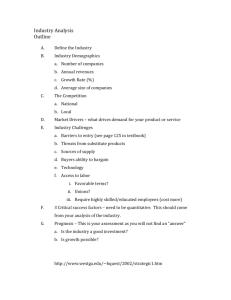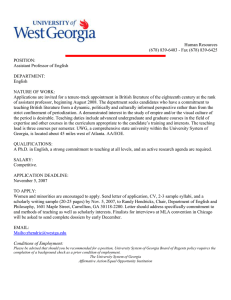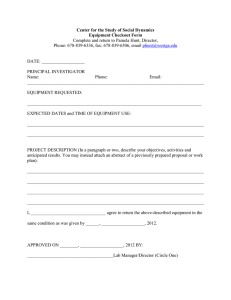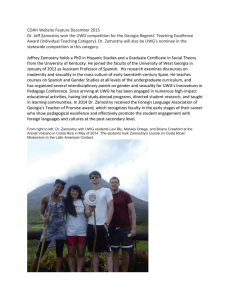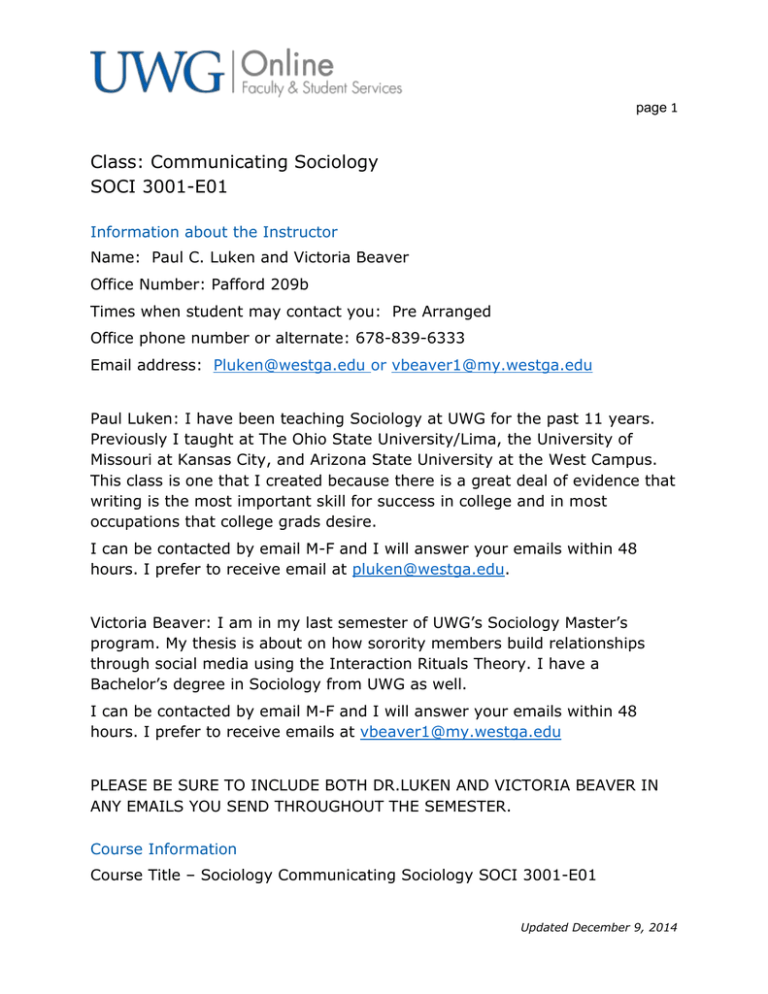
page 1
Class: Communicating Sociology
SOCI 3001-E01
Information about the Instructor
Name: Paul C. Luken and Victoria Beaver
Office Number: Pafford 209b
Times when student may contact you: Pre Arranged
Office phone number or alternate: 678-839-6333
Email address: Pluken@westga.edu or vbeaver1@my.westga.edu
Paul Luken: I have been teaching Sociology at UWG for the past 11 years.
Previously I taught at The Ohio State University/Lima, the University of
Missouri at Kansas City, and Arizona State University at the West Campus.
This class is one that I created because there is a great deal of evidence that
writing is the most important skill for success in college and in most
occupations that college grads desire.
I can be contacted by email M-F and I will answer your emails within 48
hours. I prefer to receive email at pluken@westga.edu.
Victoria Beaver: I am in my last semester of UWG’s Sociology Master’s
program. My thesis is about on how sorority members build relationships
through social media using the Interaction Rituals Theory. I have a
Bachelor’s degree in Sociology from UWG as well.
I can be contacted by email M-F and I will answer your emails within 48
hours. I prefer to receive emails at vbeaver1@my.westga.edu
PLEASE BE SURE TO INCLUDE BOTH DR.LUKEN AND VICTORIA BEAVER IN
ANY EMAILS YOU SEND THROUGHOUT THE SEMESTER.
Course Information
Course Title – Sociology Communicating Sociology SOCI 3001-E01
Updated December 9, 2014
page 2
*Times and locations: This class will demand about 2-3 hours per day of
work.
*The University’s Bookstore’s Website URL -http://www.bookstore.westga.edu
Required texts
The Sociology Student Writer’s Manual (6th Edition) by Johnson, Retting,
Scott and Garrison. Pearson Prentice Hall, 2010.
The Elements of Style (4th Edition) by Strunk and White. Longman
Publishers, 2000.
ASA Undergraduate Student Resources
http://www.asanet.org/students/resources_majors.cfm
“Majoring in Sociology”
“Navigating the Sociology Major”
“Twenty-First Century Careers with an Undergraduate Degree in Sociology”
(all links)
http://www.asanet.org/employment/careers21st_intro.cfm
“Policy on Academic Integrity.” Department of Sociology
http://www.westga.edu/sociology/index_4657.php
*Course Objectives and Learning Outcomes
Course Objectives for Students:
1. Students will assess source material pertinent to their research
project.
2. Students will recognize the transferable skills that they have acquired.
3. Students will demonstrate the ability to communicate effectively in
both spoken and written English.
4. Students will demonstrate their knowledge of ASA style for citation
and references.
Learning Outcome: The course objectives, assignments, and class
Updated December 9, 2014
page 3
activities contribute to the following learning outcome:
1. Be able to communicate (orally and in writing) how sociology
contributes to an understanding of social reality.
Attendance Policy: In an online environment attendance is observed
through online participation. The frequency and amount of online
participation will vary week to week depending upon the type of assignments
that are being undertaken at the time. It is important that you respond to all
discussions within 48 hours and that all assignments be submitted by their
due dates. It is important that you log in at the beginning of the
semester or you may be removed from the class.
*Online Support - Where and how to receive help within CourseDen or any
other problems
● Online Student Help http://uwgonline.westga.edu/students.php
● Online Student Guide http://uwgonline.westga.edu/onlinestudent-guide.php
● UWG|Online Helpdesk
○ email: online@westga.edu
○ Call 678-839-6248 or 1855-933-UWGO (8946)
● 24-Hour Help: 1-855-772-0423 or search
http://D2Lhelp.view.usg.edu
*Link to the Library’s DL services http://www.westga.edu/library/
*Course Prerequisites – including software, plug-ins, and hardware above
the basics
*Link to UWG|Online Connection website:
http://uwgonline.westga.edu/students.php (this includes links to
Orientation, basic software/hardware requirements, Online Student Guide,
and all student services)
Technology Requirements
Supported Internet Browsers
● Mozilla Firefox
○ Click on the download button; the website can tell whether
you're on Windows or Mac and will download the
Updated December 9, 2014
page 4
appropriate version.
● Safari (Mac)
● Google Chrome
○ Click on the download button; the website can tell whether
you're on Windows or Mac and will download the
appropriate version.
Java Plug-In
● Java Update
○ Click on the download button; the website can tell whether
you're on Windows or Mac and will download the
appropriate version.
Other Recommended Software
● RealPlayer Cloud
● Adobe Acrobat Reader
● Adobe Flash Player
● Apple Quicktime
● Any Video Converter
● Audacity
For a list of software available through the University for your
instructional needs, please see the Service Catalog over at
Information Technology Services.
Class Schedule Information
Tentative weekly class schedule
This schedule is subject to change.
SSWM = The Sociology Student Writer’s Manual; ES = The Elements of Style
1
Introduction
SSWM – Chapter 1, “Writing as Communication”
“Why I Am a Sociology Major” due
2
SSWM – Chapter 2, “Writing Competently”
“What is Sociology?” due
Smarthinking comments from “What Are My Strengths and
Updated December 9, 2014
page 5
Weaknesses?” due
3
ES – Chapter 1, “Elementary Rules of Usage”
Topic for Research Paper due
“What Are My Strengths and Weaknesses?” paper due
4
SSWM – Chapter 5, “Organizing the Research Process”
“Policy on Academic Integrity.”
5
Continuation of Chapter 5
ES – Chapter 4, “Words and Expressions Commonly Misused”
6
Working bibliography Part I due
SSWM – Chapter 6, “Sources of Information”
SSWM – Chapter 7, “Internet Sources and Distant Learning,” pp.138
141
7
SSWM – Chapter 3, “Formats”
SSWM – Chapter 4, “Citing Sources”
8
Working bibliography Part II due
Developing a thesis
9
Draft of thesis, summary statement and outline due
ES – Chapter 2, “Elementary Forms of Composition”
ES – Chapter 3, “A Few Matters of Form”
10
SPRING BREAK
11
SSWM – Chapter 9, “Social Issues Papers”
“Plagiarism and How to Avoid It” paper due
ES – Chapter 5, “An Approach to Style”
12
Smarthinking Comments from First Submission on Final Paper
Paper due
Skills identification
“Twenty-First Century Careers with an Undergraduate Degree in
Sociology” (all links)
13
First Submission of Final Paper due
14
Smarthinking Comments from Final Paper due
15
Final Paper due
Updated December 9, 2014
page 6
16
What I Learned in This Class due
Grading Information
1. Grades
Grades will be based on a 500-point scale:
A=450-500
B=400-449
C=350-399
D=300-349
F=000-299
2. Graded Assignments: Graded assignments in this class are
numerous and varied; therefore specific instructions will be given for
each assignment. Late assignments will lead to penalties. Faxes and
emails of assignments are not acceptable. The point value for each
5
5
5
10
20
25
30
30
100
120
150
Syllabus Quiz
Introduction Post
Final Paper Topic
Working Bibliography Part I
Academic Integrity post
Working Bibliography Part II
Three Smarthinking Submissions
Thesis, Summary Statement,
and Outline Draft
First Submission of Final Paper
Final Paper
5 Short Essays
Turnitin software will be used for some assignments. Cases of plagiarism or
double dipping (submitting an assignment that was prepared for another
Updated December 9, 2014
page 7
class) can result in failing the course and having this academic dishonesty
reposted to the Provost and Vice President for Academic Affairs. There are
no excuses for plagiarism or double dipping.
A link to UWG’s Network Usage Policies at
http://www.westga.edu/policy/index_3706.php
A link to the Student Handbook, detailing instructions to visit the Rights and
Responsibilities section, including the Honor Core and all Appendices
available http://www.westga.edu/handbook/
I recommend that students should make at least electronic copies of
everything submitted
Academic Support
Center for Academic Success
The new Center for Academic Success (CAS) provides services, programs,
and opportunities to help all undergraduate students succeed academically.
The CAS offers free appointment-based peer tutoring in core courses, as well
as supplemental instruction (SI)—which is peer-facilitated collaborative
learning—in a variety of disciplines. Students seeking help with study skills
and strategies can attend workshops though the Academic Success
Workshop series, or work individually with either a staff or peer Academic
Coach. Beginning fall 2014, the CAS will also offer “Back on Track,” a
voluntary academic recovery program designed for students who want to
improve their grades and academic standing.
The Center for Academic Success is located in UCC 200, and can be reached
at 678-839-6280. Our email address is cas@westga.edu. Beth Spencer
serves as the Director of the Center for Academic Success, and Christie
Williams serves as the Associate Director. Kim Parris coordinates outreach
to at-risk first-year students, and Carrie Ziglar coordinates the peer learning
programs. A new coordinator for second-year at-risk students will be in
place by the end of fall semester.
If you have any questions or concerns about Smarthinking, please contact
the DDEC's UWG|Online Help Desk, and your inquiry will be directed to the
appropriate representative: online@westga.edu or 678-839-6248.
Updated December 9, 2014
page 8
American with Disabilities Act Statement
Students with a documented disability may work with UWG Accessibility
Services to receive essential services specific to their disability. All
entitlements to accommodations are based on documentation and USG
Board of Regents standards. All students are provided with equal access to
classes and materials, regardless of special needs, temporary or permanent
disability, special needs related to pregnancy, etc. For more information,
please contact Disability Services at the University of West Georgia:
http://www.westga.edu/studentDev/index_8884.php.
If you are a student who is disabled as defined under the Americans with
Disabilities Act and requires assistance or support services, please notify me
prior to attempting any activities or assessments in this course.
UWG Accessibility Services
http://www.westga.edu/counseling/4486.php
Brightspace by D2L
http://www.brightspace.com/about/accessibility/
https://documentation.desire2learn.com/en/Using%20assistive%20tec
hnology%20in%20Desire2Learn
Blackboard Collaborate
http://www.blackboard.com/Platforms/Collaborate/Products/Blackboar
d-Collaborate/Web-Conferencing/Accessibility.aspx
YouTube
https://support.google.com/youtube/answer/189278?hl=en
Academic Honesty Statement/Plagiarism Software
Each faculty member will use the Academic Honesty Statement and
policies developed by his/her discipline unit. For the Department of
Sociology these policies can be found at
http://www.westga.edu/sociology/index_4657.php.
University of West Georgia Student Code of Conduct 2014-2015
Updated December 9, 2014
page 9
The content of this handbook was the most up-to-date information available
at the time of printing. However, polices and procedure updates may happen
during an academic year. Please refer to the University of West Georgia
website for the most current version of these policies, processes, and
procedure. This handbook is published by the Division of Student Affairs and
Enrollment Management. For questions or more information, please call 678839-6423.
2.00 ACADEMIC DISHONESTY All forms of academic dishonesty,
including, but not limited to cheating*, fabrication*, plagiarism*, and
facilitating or allowing academic dishonesty in any academic exercise.
.01 Cheating: Cheating means using, attempting to use or aiding
others in using unauthorized materials, information or study
aids. It also means gaining unauthorized access to unauthorized
materials.
.02 Fabrication: Fabrication means falsification or unauthorized
invention of any information or citation.
.03 Plagiarism: Plagiarism means representing the words or
ideas of another as one’s own. Direct quotations must be
indicated and ideas of another must be appropriately
acknowledged.
Retrieved December 5, 2014 http://www.westga.edu/assetsSA/handbook/Student_Code_of_C
onduct_Final_2014-2015_(Aug_22).pdf
See the Honor Code for additional examples of academic
dishonesty.
Privacy Policies
Online Privacy
This course may require you to work with other sites and entities beyond
UWG and CourseDen (Brightspace D2L) where some personal information
(e.g. your name, affiliation with UWG, or current employment) may be
displayed. You have the right to regulate the displaying of information
pertaining to yourself on the Internet. If you are uncomfortable displaying
Updated December 9, 2014
page 10
information you deem overly personal, you may take steps (such as posting
online your first name and last initial only or other pseudonym) to post more
anonymously. You also agree to respect other people’s wishes to remain
anonymous.
Links to and from Third-Party Sites
There may be links established between this course and other entities and
sites on the World Wide Web, Internet or other areas that are not under the
control of, nor maintained by your professor(s) or the University of West
Georgia (UWG). These links do not necessarily constitute an endorsement by
your professor(s) or UWG, and UWG has no obligation to monitor such sites,
and user agrees that neither your professor nor UWG is responsible for the
content of such sites or any technical or other problems associated with any
such third-party site, links, or usage.
Desire2Learn
http://www.brightspace.com/legal/privacy/
YouTube
https://www.youtube.com/static?template=privacy_guidelines
Wimba
http://www.wimba.com/legal/privacy/
Blackboard Collaborate
http://www.blackboard.com/Footer/Privacy-Policy.aspx
Turnitin
http://turnitin.com/en_us/about-us/privacy-center/privacypledge
CoursEval
http://www.connectedu.com/courseval/helpcenter/Policies/Cours
EvalPrivacyPolicy.htm
UWG Email Policy
University of West Georgia students are provided a MyUWG e-mail account.
Updated December 9, 2014
page 11
The University considers this account to be an official means of
communication between the University and the student. The purpose of the
official use of the student e-mail account is to provide an effective means of
communicating important university related information to UWG students in
a timely manner. It is the student’s responsibility to check his or her email
(University of West Georgia Student Code of Conduct).
Equal Opportunity Statement
No person shall, on the grounds of race, color, sex, religion, creed, national
origin, age, or disability, be excluded from employment or participation in,
be denied the benefits of, or otherwise be subjected to discrimination under
any program or activity conducted by UWG.
Affirmative Action Statement
The University of West Georgia adheres to affirmative action policies to
promote diversity and equal opportunity for all faculty and students.
Updated December 9, 2014

